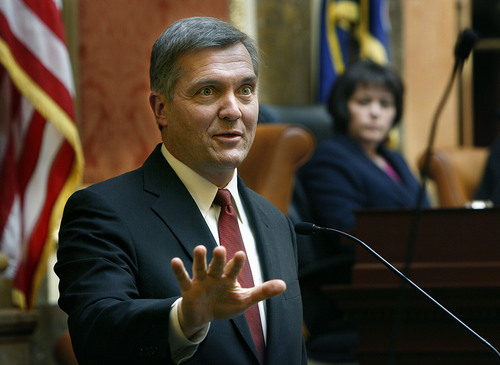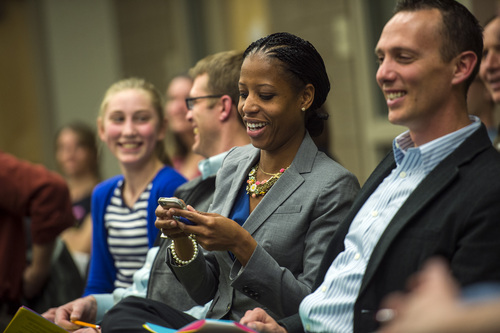This is an archived article that was published on sltrib.com in 2014, and information in the article may be outdated. It is provided only for personal research purposes and may not be reprinted.
A scrappy former mayor faces a challenge from a business executive with Olympic ties. A lawyer and the son of a Utah political legend goes up against an engineer with his own theory on reducing the debt.
One of them will represent Utah in Congress unless a third-party candidate pulls off a huge upset.
The state's 4th Congressional District seat is up for grabs this November after Rep. Jim Matheson, D-Utah, decided against seeking an eighth term in office. Two Republicans and two Democrats, along with three third-party candidates have filed to replace him, with the major party showdowns taking place on April 26 at state party conventions. Here's a look at the candidates who are busy wooing delegates with the hopes of representing their party in the general election:
—
The Republicans • A Democrat now represents the 4th District, which includes western Salt Lake County and a big chunk of Utah County, but the population there skews Republican. That means that whoever gets the GOP nomination is likely to be the front-runner this November.
This contest includes two people who ran for Congress in 2012. Mia Love, the former mayor of Saratoga Springs, narrowly lost to Matheson in the 4th District and is seeking a second chance to represent her party. Her opponent is Bob Fuehr, who lost in a bid to get the GOP nomination in the 2nd Congressional District two years ago, and is now running in the district in which he lives.
So far, few policy disputes have emerged, making this a race that is focusing largely on leadership style and popularity.
Love is seen as the person to beat. Her 2012 race, which included millions of dollars in TV ads, made her a widely known figure in the state. She also made a splash on the national stage, with a prime-time appearance at the Republican National Convention. If she won, she'd make history as the first black woman to caucus with House Republicans.
She's telling the 900 Republican delegates that this is a race pitting Washington elites against the average people of Utah. She's criticizing "the people in Washington who say, 'Hey, I'm an attorney. I'm a Harvard graduate. I'm smart enough to make this decision for you.'
"It is time for us, the people, to go to Washington to get our country back and that is normal people with normal lives," she said.
Fuehr is Harvard educated. He has decades of experience at major businesses, and he worked for former Gov. Mike Leavitt as the director of business and economic development. His goal is to convince delegates that he has the experience and background to better represent them in Washington.
"You are the product of your life experiences," he said. "When you elect a congressman, you are really hiring someone to go to Washington to make the best decisions they can."
Fuehr has billboards on Interstate 15 and ads running on the radio hoping to draw enough attention that he could at least force a primary election this June. To do that, he'd need to get more than 40 percent of the delegate vote at the state convention.
—
The Democrats • When Matheson announced in December that he wouldn't run for another term, attorney Doug Owens thought he might give it a shot. But he waited a month, seeing who else may emerge. No one did.
"I thought it is time to stand up for what I believe, no one else going to do it for me," he said. The same day he filed for office, so did Bill Peterson, a retired engineer who ran for Senate in 2012 as a Democrat, but didn't win the party's nomination.
Owens hasn't run for office before, but he isn't new to politics. He's the son of the late Rep. Wayne Owens, who represented the state for one term before running and losing for the U.S. Senate in 1974. He was re-elected to the House in 1986. He won two re-election bids before losing a Senate election in 1992. He died in 2002.
Doug Owens sees himself as following the political legacy of his father and Matheson, moderate Democrats willing to work with Republicans to strike compromises. He expressed disgust at "the dysfunction in Washington."
"We have to change it, even if that means one district at a time," he said. And Owens is not deterred by political handicappers like the people at Cook Political Report who say the race is likely to fall into Republican hands.
"I wouldn't have done it to be a sacrificial lamb," said Owens. "Underdogs win all the time. I think there is a good chance."
Owens is a lawyer with 20 years' experience who works at Holland & Hart, normally serving as a defense attorney for businesses. At this stage he's focusing his attention on his Democratic opponent, but did say: "We will work like heck and try to win the race and do our best. I'm confident it can be done, no matter who that opponent ends up being."
Peterson has used his engineering training to analyze the economy. He said if politicians want to reduce the nation's debt, they have to do what they can to reduce the trade imbalance the United States has with many of its foreign partners.
This is Peterson's primary issue, one he says he has fought Sen. Orrin Hatch over for more than 20 years.
While he has little in the way of a formal campaign operation, he's running because "nobody is listening."
"We ought to put the effort into this thing that we have into a war," said Peterson, a former Republican.
Beyond the major party candidates, three others are seeking the office. They are Jim Vein running as a Libertarian, Collin Robert Simonsen with the Constitution Party and Tim Aalders from the Independent American Party.
Twitter: @mattcanham





